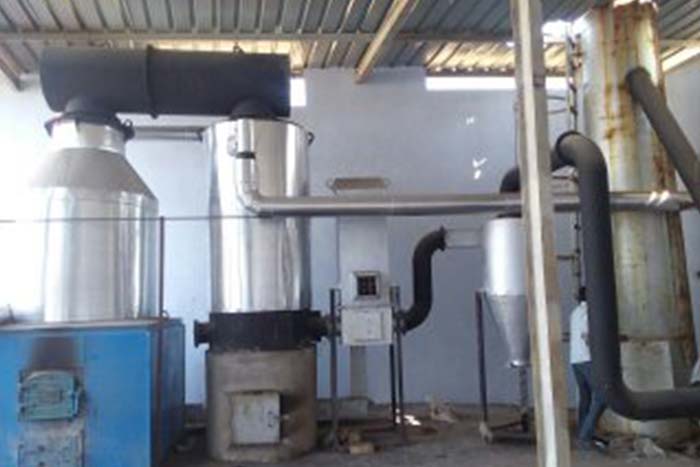
Thermic Fluid Heater Manufacturer in India
A Thermic Fluid Heater is an industrial heating system used to transfer heat to a process or equipment without the direct use of steam. Instead of water or steam, it uses a special heat transfer fluid (thermic fluid) that can operate at high temperatures.
Working of a Thermic Fluid Heater :
1. Heat Generation : The thermic fluid heater has a combustion chamber where fuel (natural gas, oil, coal, etc.) is burned. This combustion generates hot gases.
2. Heat Transfer to Fluid : The hot gases produced from combustion pass through a heat exchanger where the thermic fluid (usually a synthetic oil) circulates. The heat from the gases is transferred to the fluid.
3. Circulation : The heated thermic fluid is then pumped through a closed-loop system to various heat-consuming processes or equipment. The fluid transfers its heat to the process and returns to the heater to be reheated.
4. Temperature Control : The temperature of the thermic fluid is controlled using a thermostat or other control mechanisms to ensure the desired heat is delivered.
5. Heat Recovery : Some systems may have heat recovery units to maximize efficiency by preheating the combustion air or recirculating exhaust gases.
6. Exhaust : After transferring its heat to the fluid, the cooled flue gases are exhausted through a chimney.
Key Features of Thermic Fluid Heaters :
1. High-Temperature Operation : Thermic fluid heaters can operate at very high temperatures (up to 400°C or higher) without the need for high-pressure systems, unlike steam boilers.
2. Efficiency : These heaters are highly efficient as they recover heat from flue gases and often include advanced combustion control systems.
3. Closed-Loop System : The closed-loop design ensures minimal heat loss, and the fluid can be reused, reducing the need for continuous fluid replenishment.
4. Low Maintenance : Since there's no phase change (as with steam boilers), thermic fluid heaters generally require less maintenance and have a longer lifespan.
5. Safety : Operating at low pressure reduces the risk of explosion, making them safer compared to steam-based systems.
6. Versatility : They can be used for a wide range of industrial applications, including chemical processing, textile manufacturing, food processing, and more.
7. Compact Design : Thermic fluid heaters are usually more compact than equivalent steam boilers, saving space in industrial setups.
8. Environmental Benefits : Modern thermic fluid heaters are designed with low NOx burners and other features to minimize environmental impact.
9. Control Systems : Advanced models include sophisticated control systems for better temperature regulation, fuel efficiency, and monitoring.
10. Flexibility in Fuel Options : They can be designed to operate on various fuels like natural gas, oil, or coal, depending on availability and cost.
Tags: Thermic Fluid Heater Manufacturer in Karnataka, Thermic Fluid Heater Manufacturer in Madhya Pradesh, Thermic Fluid Heater Manufacturer in Maharashtra, Thermic Fluid Heater Manufacturer in Pune, Thermic Fluid Heater Manufacturer in Rajasthan, Thermic Fluid Heater Manufacturer in Surat, Thermic Fluid Heater Manufacturer in Tamil Nadu, Thermic Fluid Heater Manufacturer in Vadodara, Thermic Fluid Heater Manufacturer in West Bengal
